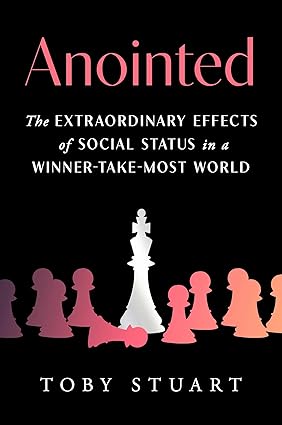Book
- Home
- Book

Book Synopsis
A leading organizational theorist takes us deep into the realm of humanity’s most powerful invisible force—social status—and how it shapes everything from who we trust and what we value to which ideas and innovations change the world and who gets credit for their success.
Why does an authentic Rembrandt fetch hundreds of millions while a nearly identical painting by his most talented disciple goes for a tiny fraction of that price? What makes a restaurant “hot,” a neighborhood “up-and-coming,” or a technology “the next big thing”? Why do people often choose the same seats in recurrent office meetings? Who is most likely to interrupt someone else mid-sentence? Why do big name lawyers earn so much? Why are health disparities so pronounced? And why, when someone gets a bit ahead in life, does the small advantage so often compound?
The answer to all these questions is social status—invisible hierarchies that influence every aspect of our lives, from our health to our personal relationships and careers to how we behave in social and work settings to the tastes and preferences we form. Without it, we’d be lost and paralyzed when faced with even the simplest decisions. But it comes at a steep cost: status works as a powerful amplifier, turning small initial advantages into insurmountable leads. Inequality is baked into its core.
Through compelling examples from business, economics, literature, art, fashion, and beyond, Anointed demonstrates how status cascades through society, creating winners and losers in ways that often have little to do with merit. And how new technology offers a glimpse of a more equitable future.
Buy Form Other Retailers
Book Review
How a particular social phenomenon shapes our lives, prospects, and futures.
In modern society, according to UC Berkeley business professor Stuart, “anointment” refers to “a ubiquitous process in which a person or institution of high regard confers status on something or someone else explicitly or simply by association.” (The author readily acknowledges that he is one of the anointed himself.) A Rembrandt painting is considered magnitudes more valuable than an almost indistinguishable reproduction by a no-name artist. This is an example of the “Big Shift,” a term Stuart uses to describe one of the mental shortcuts that anointment allows us to make: We evaluate the worthiness of a person or object by the status or prestige of its affiliations rather than its inherent quality. Unfortunately but unsurprisingly, anointment contributes to inequality. Graduates of a particular elite institution may favor candidates with the same credentials when considering potential job applicants. Read Full Review.
Publisher
Simon & Schuster
Pages
288 Pages
Release
September 2, 2025
Language
English

12 September 2025


